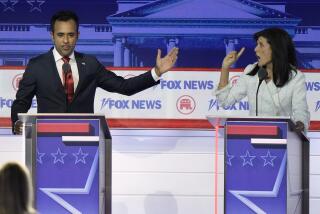Kemp, Gephardt Clash on Foreign Policy
- Share via
NASHUA, N. H. — Republican Rep. Jack Kemp and Democratic Rep. Richard A. Gephardt Thursday clashed over the use of power to further American interests abroad in a presidential campaign debate that crystallized sharp foreign policy differences between the two political parties.
Kemp, proclaiming himself a “heavily armed dove,” charged that the Democrats stand for “appeasement, isolationism and unilateral disarmament.”
Gephardt responded that the Republicans’ approach to international affairs is to try to “wipe out” anyone who disagrees with them.
The hourlong debate at Rivier College, a small Roman Catholic women’s school, was the second of two confrontations between the two candidates early in the 1988 presidential campaign. The first, held five weeks ago in Iowa, concentrated on domestic issues, particularly trade.
The televised sessions between the two congressmen put in crisp contrast the policy questions that will be at the center of the 1988 presidential contest.
Kemp presented himself as the ideological heir of President Reagan, advocating a muscular, force-based foreign policy. On international affairs, Gephardt mirrors the views of the liberal wing of the Democratic Party, in most instances favoring diplomacy over confrontation.
The candidates disagreed on nearly every foreign policy issue facing the country today. Gephardt attacked Reagan’s “Star Wars” missile defense system as unworkable and impossibly expensive.
Stresses Arms Control Talks
The St. Louis Democrat said that, although the nation must maintain a strong defense, it must first seek accommodation with the Soviets through arms control talks.
“Doves who are too heavily armed cannot fly,” he jabbed.
Kemp responded: “Don’t you realize, Dick, that the Soviet Union is a Marxist-Leninist government that can only be negotiated with from a position of strength? Not trepidation or timidity, but strength.”
Kemp, a nine-term congressman from Buffalo, N. Y., and a former professional football star, seemed to reflect the views of the 100 or so voters in the audience more closely than did Gephardt. The candidates chose the New Hampshire site--as they had the earlier Iowa locale--to gain exposure in a critical early primary state.
Kemp was applauded several times during his remarks, but Gephardt was cheered only at the close of his final statement.
Gephardt, a five-term representative from Missouri, stressed diplomacy and economic aid as the cornerstones of his foreign policy. He said the issues he and Kemp were debating presented “deep questions of right and wrong in this election.”
‘Just Plain Wrong’
It is “just plain wrong,” he said, to support mercenaries trying to overthrow the Sandinista regime in Nicaragua while denying women and minorities equal rights and ignoring the poor and homeless in America.
What is right, he insisted, is to advance the cause of human rights around the globe and to end the nuclear arms race.
Kemp forcefully repeated his support for aid to the rebels in Nicaragua, saying that only through military pressure will the Sandinistas be pushed to the peace table.
“A peace plan with no teeth won’t work,” Kemp said, drawing a parallel to the disastrous Munich peace pact of 1938.
“Diplomacy without any threat of force or any use of force is diplomacy which becomes emasculated when dealing with the central trauma of the 20th Century, the struggle between democracy and totalitarianism,” he said.
In separate press conferences after the debate, Gephardt and Kemp commented on Georgia Sen. Sam Nunn’s announcement Thursday that he would not seek the Democratic presidential nomination.
Benefit for Gephardt
Gephardt, who will benefit from not having to run against a Democratic opponent with a reputation for expertise in defense matters and a strong political base in the South, said that the party must “redouble its efforts” to rebuild its strength in the region.
Republican nominees have carried the once-solidly Democratic South in four of the last five presidential elections.
More to Read
Get the L.A. Times Politics newsletter
Deeply reported insights into legislation, politics and policy from Sacramento, Washington and beyond. In your inbox twice per week.
You may occasionally receive promotional content from the Los Angeles Times.










